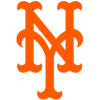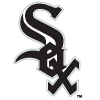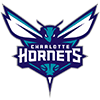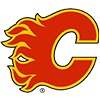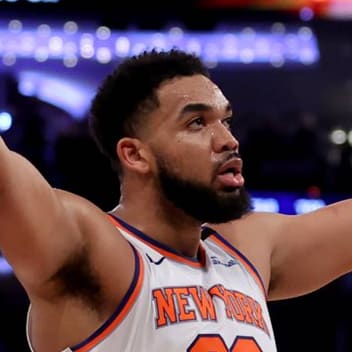Center is having a revival, with the past two MVPs -- Joel Embiid and Nikola Jokic -- playing the position. But who are the up-and-comers? For fantasy, knowing who's next is just as important as knowing who's there now.
Rising talent goes quickly in fantasy drafts as well. Managers love rostering young, exciting players. That leaves value at the end of drafts, however. Sleepers can shift fantasy fortunes, especially those found outside of the top 100.
Risers
Walker Kessler, Jazz
Last summer's No. 22 overall pick, Kessler went from inconsistent minutes off the bench to a starting gig, which fueled his rise into finishing third in Rookie of the Year voting. An injury to Kelly Olynyk in mid-January thrust Kessler into a starting role -- one he held for the remainder of the campaign.
Once a full-time starter, the rookie saw 28.2 minutes per game and averaged 11.9 points, 10.5 rebounds and 2.9 blocks while shooting 71.7 percent from the field. His total rebound percentage (19.7) ranked ninth, and his block percentage (8.6) ranked second. Kessler's free-throw percentage (48.3) was horrific but was on low volume (2.6 FTA).
Kessler will unquestionably begin 2023-24 as Utah's starting center. Considering he returned second-round per-game fantasy value after becoming a starter, the 22-year-old comes into the year with hype. Reaching into the second round for Kessler may be unwise, since his offense doesn't project to scale up much. Still, early Average Draft Position data suggests he'll be a consistent target in the
Center is having a revival, with the past two MVPs -- Joel Embiid and Nikola Jokic -- playing the position. But who are the up-and-comers? For fantasy, knowing who's next is just as important as knowing who's there now.
Rising talent goes quickly in fantasy drafts as well. Managers love rostering young, exciting players. That leaves value at the end of drafts, however. Sleepers can shift fantasy fortunes, especially those found outside of the top 100.
Risers
Walker Kessler, Jazz
Last summer's No. 22 overall pick, Kessler went from inconsistent minutes off the bench to a starting gig, which fueled his rise into finishing third in Rookie of the Year voting. An injury to Kelly Olynyk in mid-January thrust Kessler into a starting role -- one he held for the remainder of the campaign.
Once a full-time starter, the rookie saw 28.2 minutes per game and averaged 11.9 points, 10.5 rebounds and 2.9 blocks while shooting 71.7 percent from the field. His total rebound percentage (19.7) ranked ninth, and his block percentage (8.6) ranked second. Kessler's free-throw percentage (48.3) was horrific but was on low volume (2.6 FTA).
Kessler will unquestionably begin 2023-24 as Utah's starting center. Considering he returned second-round per-game fantasy value after becoming a starter, the 22-year-old comes into the year with hype. Reaching into the second round for Kessler may be unwise, since his offense doesn't project to scale up much. Still, early Average Draft Position data suggests he'll be a consistent target in the late-third to early-fourth round, and with fair reason.
Alperen Sengun, Rockets
Last season, Sengun built upon his promising rookie campaign. The No. 16 overall pick in 2021 was given a full-time starting role and set career highs nearly across the board. His playing time was noticeably increased after the New Year -- the center averaging 15.1 points, 9.3 rebounds, 4.9 assists, 1.1 steals and 1.0 blocks across 30.9 minutes in his final 43 appearances.
The 21-year-old has already proven to be one of the best post-up and passing bigs in the NBA. He's also a potent offensive rebounder, with his 12.1 offensive rebound percentage ranking 12th last season. In the vein of Nikola Jokic or Domantas Sabonis, Sengun is one of the few centers through which the offense can be run.
Though the Rockets brought in Fred VanVleet and Dillon Brooks during the offseason, Sengun should still be a crucial part of the offense. Adding a great pick-and-roll passer in VanVleet could boost Sengun's field-goal percentage and scoring, even if it comes at the expense of some assists. Even if the team isn't leaning its full weight on Sengun, fantasy managers shouldn't be scared off. His promise at such a young age is rare.
Jalen Duren, Pistons
The 13th overall pick in last year's draft, Duren had an impressive rookie season. The Memphis product came off the bench for his first 24 appearances but made his first start Dec. 9, as coach Dwane Casey shifted the struggling Marvin Bagley to the bench. Duren started 27 of his subsequent 28 showings, averaging 10.2 points, 10.4 rebounds, 1.5 assists, 0.9 blocks and 0.6 steals in 28.1 minutes. Duren was then moved back to the bench for 11 of his final 15 appearances after the Pistons acquired James Wiseman from the Warriors.
Though Duren's role yo-yoed, he proved to already be one of the league's best rebounders, finishing seventh in total rebound percentage (19.7) and fifth in offensive rebound percentage (14.7). That translated to 12.8 rebounds per 36 minutes. The 6-foot-10 big man was also an effective finisher, converting 64.8 percent of his field goals. While his shot-blocking was underwhelming, Duren was a great swatter in college, averaging 2.1 blocks in 25.3 minutes. That could be an area of improvement this season.
Duren is expected to start for Detroit this season. Wiseman is still around, as is Bagley, and Isaiah Stewart was just handed a four-year, $64 million extension. At this point, though, Duren is showing the most promise, even as a 19-year-old. The center returned 12th-round per-game value in nine-category fantasy leagues last season and should be selected much sooner this year.
Sleepers
Zach Collins, Spurs
Collins' career started slowly after being selected with the 10th overall pick in the 2017 Draft. For his first two seasons, he was stuck behind other bigs. Then, injury issues resulted in Collins appearing in just 39 games over the next three years.
Before last year's trade deadline, Collins played a backup role to Jakob Poeltl. But after the veteran was dealt to the Raptors, Collins became the full-time starting center. During his final 19 appearances, the Gonzaga product averaged 16.5 points on 49.4 percent shooting, making 1.6 threes at 39.2 percent. He also compiled 8.0 rebounds, 3.8 assists, 1.1 steals and 1.1 blocks in 28.8 minutes per game. From Feb. 10 onward, Collins returned fourth-round per-game fantasy value in nine-category formats.
Early indications out of San Antonio are that rookie Victor Wembanyama will likely be playing power forward, meaning Collins is expected to retain his starting center spot. Given how barren the Spurs' rotation was to end the year -- purposely tanking away games -- Collins probably won't see the same volume of touches he did to close out 2022-23. But it's clear he has upside as a strong per-minute producer who could see consistent minutes in the mid-to-high 20s. With that in mind, fantasy managers are within reason to draft him in standard leagues, possibly inside the top 100.
Daniel Gafford, Wizards
Gafford has produced nearly identical back-to-back seasons while with Washington. He's played a flex-starter role, getting the nod in 100 of his 150 appearances while averaging 9.2 points, 5.6 rebounds, 1.3 blocks and 1.0 assists in 20.3 minutes. Last season, his 11.7 offensive rebound percentage ranked 15th, and his 5.2 block percentage ranked ninth.
Impressive rate stats should be music to fantasy managers' ears, as Gafford is expected to be the full-time starter and see more minutes in 2023-24. Kristaps Porzingis is now in Boston, and Washington's reserve center depth is thin, featuring Mike Muscala as the No. 2 option.
After the New Year last season, Gafford returned ninth-round per-game fantasy value in just under 25 minutes per game. With the potential for Gafford to trend closer to 30 minutes and be more featured in the offense, he should be drafted sooner than the ninth this year.
Mark Williams, Hornets
The 15th overall pick last season out of Duke, Williams spent the beginning of his rookie campaign in the G League and dealing with an ankle injury. The seven-footer didn't become a consistent aspect of Charlotte's rotation until after Christmas. Even then, Williams was being squeezed into a backup role behind Mason Plumlee while also competing with Nick Richards.
However, once Plumlee was traded to the Clippers at the deadline, Williams took over as the Hornets' starting center. In his final 18 appearances (17 starts), the big man averaged 11.7 points, 9.7 rebounds and 1.1 blocks in 26.6 minutes. From Feb. 10 onward, Williams ranked 103rd in nine-category per-game fantasy value. At 21 years old, Williams has proven capable of producing quality traditional big-man stats.
There's plenty of reason for optimism this season. Williams is expected to begin the year as the Hornets' starting center, and having LaMelo Ball throw lobs is a fantastic way to create an efficient scoring profile as a rim-running big. Given that Williams has already demonstrated near-top-100 upside as a low-minute starter, he's in great position for a small breakout. With the lack of name recognition, you may not have to reach inside the top 100, but it's hard to argue with trying to secure Williams as early as the eighth round.








